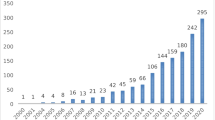Abstract
Proficiency in digital literacy refers to the ability to read and write using online sources, and includes the ability to select sources relevant to the task, synthesize information into a coherent message, and communicate the message with an audience. The present study examines the determinants of digital literacy proficiency by asking 150 students who had 50 min of access to the Internet and a word processor to produce a research report on whether or not their college should require all students to own a laptop computer. The resulting essay received a holistic rating from 1 to 5. Concerning knowledge underlying digital literacy, the major predictors of digital literacy proficiency (as measured by essay rating) were academic experience (undergraduate versus graduate status) and domain knowledge (based on a questionnaire), rather than technical knowledge about how to use computers (based on a questionnaire). Concerning processing during the task, the major predictors of digital literacy proficiency were integrating processes (such as number of unique sources, citations, or supporting details) rather than search processes (such as number of actions, web pages, websites, links, or search terms). In short, proficiency in digital literacy depended mainly on academic experience rather than technical experience, and on how learners organize and integrate the information they find rather than on how much information they peruse. Findings from this study suggest that the basic tenets of good scholarship apply to digital media.
Similar content being viewed by others
References
Barton, D. (2001). Directions for literacy research: Analysing language and social practices in a textually mediated world. Language and Education, 15, 92–104.
Bennett, S., Maton, K., & Kervin, L. (2008). The ‘digital natives’ debate: A critical review of the evidence. British Journal of Educational Technology, 39, 775–786.
Brand-Gruwel, S., Wopereis, I., & Vermetten, Y. (2005). Information problem solving by experts and novices: Analysis of a complex cognitive skill. Computers in Human Behavior, 21, 487–508.
Bråten, I., Strømsø, H. I., & Salmerón, L. (2011). Trust and mistrust when students read multiple information sources about climate change. Learning and Instruction, 21, 180–192.
Coiro, J., Knobel, M., Lankshearm, C., & Leu, D. J. (Eds.). (2008). Handbook of research on new literacies. New York, NY: Erlbaum.
Gee, J. P. (2003). What video games have to teach us about learning and literacy. New York: Palgrave Macmillan.
Glister, P. (2000). Digital literacy. In R. Pea (Ed.), The Jossey-Bass reader on technology and learning (pp. 215–225). San Francisco, CA: Jossey-Bass Inc.
Hargittai, E., Fullerton, L., Menchen-Trevino, E., & Thomas, K. Y. (2010). Trust online: Young adults’ evaluation of web content. International Journal of Communication, 4, 468–494.
Jenkins, H. (2006). Convergence culture. New York: New York University Press.
Jmerik, A. (2004). Boss Everyware. (Customized version) [Computer software]. Boss Everyware, Inc. Retrieved July 14, 2004. http://www.bosseveryware.com.
Lazonder, A. W. (2000). Exploring novice users’ training needs in searching information on the WWW. Journal of Computer Assisted learning, 16, 326–335.
Lenhart, A., Lewis, O., & Rainie, L. (2001). Teenage life online. Washington DC: Pew Internet & American Life Project.
Livingstone, S., & Helsper, E. (2007). Gradations in digital inclusion: Children, young people, and the digital divide. New Media & Society, 9, 671–696.
Lombard, M., Snyder-Duch, J., & Bracken, C. C. (2002). Content analysis in mass communication: Assessment and reporting of intercoder reliability. Human Communication Research, 28, 587–604.
Mayer, R. E. (2009). Multimedia learning (2nd ed.). New York, NY: Cambridge University Press.
Metzger, M. (2007). Making sense of credibility on the Web: Models for evaluating online information and recommendations for future research. Journal of the American Society for Information Science and Technology, 58, 2078–2091.
Nasah, A., DaCosta, B., Kinsell, C., & Seok, S. (2010). The digital literacy debate: An investigation of digital propensity and information and communication technology. Educational Technology Research and Development, 58, 531–555.
Oblinger, D. G. & Oblinger, J. L. (2005). Educating the net generation. Boulder, CO: Educause. Retrieved from http://www.educause.edu/educatingthenetgen.
Palfrey, J., & Gasser, U. (2008). Born digital: Understanding the first generation of digital natives. Philadelphia, PA: Perseus Books Group.
Prensky, M. (2001). Digital natives, digital immigrants. On the Horizon, 9, 1–6. Retrieved from http://www.marcprensky.com/writing/.
Rouet, J.-F. (2003). What was I looking for? The influence of task specificity and prior knowledge on students’ search strategies in hypertext. Interacting with Computers, 15, 409–428.
Rouet, J.-F. (2006). The skills of document use. Mahwah, NJ: Erlbaum.
Salen, K. (2007). Gaming literacies: A game design study in action. Journal of Educational Multimedia and Hypermedia, 16, 301–322.
Tapscott, D. (1997). Growing up digital: The rise of the net generation. New York, NY: McGraw-Hill.
Wiley, J., Goldman, S. R., Graesser, A. C., Sanchez, C. A., Ash, I. K., & Hemmerich, J. A. (2009). Source evaluation, comprehension, and learning in Internet science inquiry tasks. American Educational Research Journal, 46, 1060–1106.
Wineburg, S. S. (1991). Historical problem solving: A study of the cognitive process used in the evaluation of documentary and pictorial evidence. Journal of Educational Psychology, 83, 73–87.
Author information
Authors and Affiliations
Corresponding author
Rights and permissions
About this article
Cite this article
Bulger, M.E., Mayer, R.E. & Metzger, M.J. Knowledge and processes that predict proficiency in digital literacy. Read Writ 27, 1567–1583 (2014). https://doi.org/10.1007/s11145-014-9507-2
Published:
Issue Date:
DOI: https://doi.org/10.1007/s11145-014-9507-2




